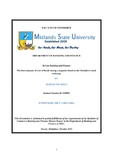Please use this identifier to cite or link to this item:
https://cris.library.msu.ac.zw//handle/11408/2218| Title: | The determinants of cost of funds among companies listed on the Zimbabwe stock exchange. | Authors: | Maburutse, Brian | Keywords: | Cost of funds. Zimbabwe stock exchange. |
Issue Date: | Oct-2015 | Publisher: | Midlands State University | Abstract: | The main aim of the study was to analyse the determinants of cost of capital among companies listed on the Zimbabwe stock exchange. The major objective of the research was to come up with those factors which have an influence on the cost of capital and to what extend. Valuation methods, models of cost of capital and determinants of cost of capital also complemented the research. Related studies done in the past support that there are various factors which influence cost of capital such as size, growth, leverage, tax and total assets only to mention a few. The research used explanatory research design and used secondary data and this data was found from different reliable sources such as the Zimbabwe Stock Exchange, Zimbabwe National Statistics and Imara Edwards securities. Multiple regression was used and the results show that the cost of equity is influenced by the size of the company, gearing level of the company. Most of the results were consistent with literature such as a positive relationship between size and cost of capital. Also the findings suggest that the factors which influence the cost of capital vary across the various sectors and industries hence the need of sector analysis. The results will aid in helping companies to review their estimations on the cost of capital , the allocation of capital, capital structuring and also aid the regulating board to adjust their policies based on effects of cost of capital determinants. The study was also able to conclude that a company which is asset backed is more attractive to investors since it is more secure thereby creating some form of trust between investors and the company hence a lower cost of capital. The Government or regulatory board through its monetary policy should try to maintain low and favourable interest rates even in harsh economic conditions so as to make sure that small and young companies get continuous access to sufficient funds to enable them to remain stable and healthy. Also policies that support company growth will result in a healthy economy. | URI: | http://hdl.handle.net/11408/2218 |
| Appears in Collections: | Bachelor Of Commerce Banking And Finance Honours Degree |
Files in This Item:
| File | Description | Size | Format | |
|---|---|---|---|---|
| Maburutse Brian.pdf | Full text | 877.27 kB | Adobe PDF |  View/Open |
Page view(s)
80
checked on Jan 14, 2025
Download(s)
92
checked on Jan 14, 2025
Google ScholarTM
Check
Items in MSUIR are protected by copyright, with all rights reserved, unless otherwise indicated.


